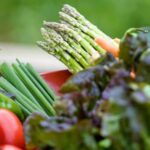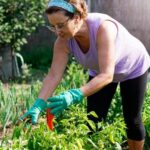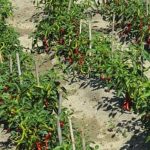Are you interested in starting a vegetable garden in Albuquerque? Vegetable gardening in Albuquerque offers a unique set of challenges and opportunities due to the specific climate and soil conditions of the area. Whether you are a seasoned gardener or a beginner, it is essential to understand the factors that contribute to successful vegetable gardening in Albuquerque.
Albuquerque’s semi-arid climate and alkaline soil present both advantages and obstacles for vegetable gardening. With the right knowledge and preparation, you can cultivate a thriving garden that provides an abundance of fresh produce for you and your family. From choosing the right vegetables to understanding irrigation techniques, this article will provide you with all the information you need to start and maintain a successful vegetable garden in Albuquerque.
In this article, we will delve into the specifics of vegetable gardening in Albuquerque, including the climate and soil conditions unique to the area. We will also discuss choosing the right vegetables for your garden, tips for starting and maintaining your garden, as well as dealing with common pests and diseases.
Additionally, we will explore watering and irrigation techniques, harvesting and preserving your produce, as well as community resources available to support vegetable gardeners in Albuquerque. So let’s get started on your journey to successful vegetable gardening in Albuquerque.
The Climate and Soil in Albuquerque
Albuquerque’s unique climate and soil conditions pose both challenges and opportunities for vegetable gardening enthusiasts. Understanding these environmental factors is essential for successful cultivation of a thriving garden.
The climate in Albuquerque is characterized by hot, dry summers and mild winters, with low average annual precipitation. The city also experiences large temperature fluctuations between day and night, which can impact the growth and development of vegetables. In terms of soil, Albuquerque predominantly has clay soil with alkaline pH levels, making it essential for gardeners to take specific measures to prepare their soil for optimal vegetable growth.
To successfully navigate the climate and soil conditions in Albuquerque, here are some key considerations for vegetable gardening:
- Select vegetables that are well-adapted to the arid climate and can withstand high temperatures and low water availability. Options such as tomatoes, peppers, squash, and beans are good choices for Albuquerque vegetable gardens.
- Amend the soil with organic matter such as compost or manure to improve its structure, moisture retention, and nutrient content. This will help counteract the alkalinity of the clay soil while providing essential nutrients for plant growth.
- Implement mulching techniques to conserve moisture in the soil, reduce temperature fluctuations, and suppress weed growth. Mulching also helps protect delicate plant roots from extreme heat.
By carefully considering the specific climate and soil conditions in Albuquerque, vegetable gardeners can make informed decisions about plant selection, soil preparation, and cultivation techniques tailored to their local environment.
Overall
Choosing the Right Vegetables for Your Albuquerque Garden
When choosing the right vegetables for your Albuquerque garden, it is important to consider the unique climate and soil conditions of the area. The high desert climate of Albuquerque, characterized by hot, dry summers and cold winters, can pose specific challenges for vegetable gardening. However, there are many vegetables that are well-suited to this environment and can thrive with the proper care.
One of the most important factors to consider when choosing vegetables for your Albuquerque garden is their ability to tolerate heat and drought. Some heat-tolerant vegetables that do well in Albuquerque include tomatoes, peppers, eggplant, and squashes. Additionally, root vegetables like carrots, beets, and radishes tend to perform well in the sandy soils of the region.
It is also essential to select vegetable varieties that have a short growing season and can mature quickly. In Albuquerque’s climate, the growing season is relatively short, so early-maturing varieties of crops such as lettuce, spinach, and peas are ideal choices for a successful vegetable garden.
Finally, it is crucial to consider water requirements when selecting vegetables for your Albuquerque garden. Drought-resistant varieties such as drought-tolerant beans or cowpeas can help conserve water while still producing a bountiful harvest.
Tips for Starting and Maintaining a Vegetable Garden in Albuquerque
Site Selection and Preparation
Before starting your vegetable garden in Albuquerque, it’s crucial to carefully select the site and prepare the soil. Choose a location that receives at least 6-8 hours of direct sunlight and has good drainage. The soil in Albuquerque is typically alkaline, so consider conducting a soil test to determine its pH level and nutrient content. Amend the soil as needed to create a healthy growing environment for your vegetables.
Understanding Planting Dates
Albuquerque experiences a unique climate with hot, dry summers and mild winters. It’s essential to understand the optimal planting dates for different vegetables in this region. Cool-season crops like lettuce, kale, and peas can be planted in early spring or late summer, while warm-season crops such as tomatoes, peppers, and squash thrive when planted after the last frost date in spring.
Maintaining Your Garden
Once your vegetable garden is established, regular maintenance is key to its success. Be diligent about watering your plants deeply but infrequently to encourage deep root growth and resilience against drought conditions. Mulching around your plants can help conserve moisture, suppress weeds, and moderate soil temperature. Additionally, stay vigilant against common pests and diseases by inspecting your plants regularly and taking prompt action if any issues arise.
By following these tips for starting and maintaining a vegetable garden in Albuquerque, you can set yourself up for a bountiful harvest of fresh produce that thrives in the unique environment of this region. Whether you’re a novice gardener or have years of experience, embracing vegetable gardening in Albuquerque can be a rewarding endeavor that provides nutritious food for you and your family.
Dealing With Common Pests and Diseases in Albuquerque Vegetable Gardens
When it comes to vegetable gardening in Albuquerque, one of the biggest challenges that gardeners face is dealing with common pests and diseases that can wreak havoc on their crops. However, with the right knowledge and strategies, it is possible to minimize the damage caused by these unwanted visitors.
Here are some tips for dealing with common pests and diseases in your Albuquerque vegetable garden:
1. Identify the pests and diseases: The first step in managing pest and disease problems in your vegetable garden is being able to identify them. Keep an eye out for common pests such as aphids, caterpillars, and grasshoppers, as well as diseases like powdery mildew and blossom end rot.
2. Practice good garden hygiene: Maintaining a clean and tidy garden can go a long way in preventing pest and disease issues. Remove any diseased or infested plants promptly, and keep the area around your garden free from debris that could harbor pests.
3. Utilize natural pest control methods: Instead of reaching for chemical pesticides, consider using natural methods to control pests in your Albuquerque vegetable garden. This can include introducing beneficial insects like ladybugs and lacewings, or using organic sprays made from ingredients like neem oil or garlic.
By following these tips and staying diligent about monitoring for pest and disease issues, you can enjoy a successful vegetable gardening experience in Albuquerque while minimizing the impact of common threats to your crops. With proper care and attention, you can overcome these challenges and reap a bountiful harvest from your Albuquerque vegetable garden.keyword: Vegetable Gardening Albuquerque.
Watering and Irrigation Techniques for Vegetable Gardening in Albuquerque
When it comes to vegetable gardening in Albuquerque, one of the most important factors to consider is watering and irrigation. The climate in Albuquerque is characterized by low annual rainfall and high evaporation rates, making it essential for gardeners to have effective watering techniques in place.
One of the best ways to ensure that your vegetable garden receives adequate water is to use drip irrigation systems. These systems deliver water directly to the base of plants, reducing water loss through evaporation and minimizing weed growth. Additionally, using mulch in your garden can help retain soil moisture and reduce the frequency of watering needed.
It’s also crucial to pay attention to the timing of watering your vegetable garden in Albuquerque. Watering early in the morning or late in the evening can help minimize water loss due to evaporation during the hottest parts of the day. This can be particularly beneficial during the hot and dry summer months that are typical of Albuquerque’s climate.
Proper watering techniques are essential for successful vegetable gardening in Albuquerque, so it’s important for gardeners to stay informed and make use of available resources such as local gardening clubs and agricultural extension services for guidance on efficient irrigation practices. By implementing these techniques, you can help ensure that your vegetables thrive despite the unique environmental challenges posed by Albuquerque’s climate.
| Watering Techniques | Benefits |
|---|---|
| Drip Irrigation Systems | Reduces water loss through evaporation and minimizes weed growth. |
| Mulching | Retains soil moisture and reduces watering frequency. |
| Timing of Watering | Minimizes water loss due to evaporation during hot parts of the day. |
Harvesting and Preserving Your Albuquerque Vegetable Garden Produce
Once your vegetable garden in Albuquerque has flourished and produced a bountiful harvest, it’s time to reap the rewards of your hard work. Harvesting and preserving your produce is an important aspect of vegetable gardening, as it allows you to enjoy the fruits of your labor for months to come. In this section, we will discuss the best practices for harvesting and preserving your Albuquerque vegetable garden produce.
When it comes to harvesting your vegetables, timing is key. Different vegetables have different optimal harvest times, and it’s important to pick them at the right moment to ensure the best flavor and texture.
For example, tomatoes should be harvested when they are fully ripe but still firm, while leafy greens like lettuce and spinach are best picked when they are young and tender. Be sure to research the specific harvesting techniques for each type of vegetable in your garden.
Once you’ve harvested your vegetables, it’s time to think about preserving them for future use. There are several methods of preservation that can be used in Albuquerque, including canning, freezing, and drying. For example, if you have an abundance of tomatoes, you can consider making homemade tomato sauce or salsa and then canning them for later use.
Leafy greens can be blanched and frozen for long-term storage. By utilizing these preservation techniques, you can enjoy the flavors of your Albuquerque vegetable garden throughout the year.
Preserving the abundance from your Albuquerque vegetable garden also allows you to share with friends and family or even donate excess produce to local food banks or community organizations. Additionally, by mastering preservation techniques such as canning or freezing, you can reduce food waste by ensuring that nothing goes to waste from your garden. These practices not only benefit you but also contribute positively to the wider Albuquerque community through sharing resources and reducing food waste.
Community Resources and Support for Vegetable Gardeners in Albuquerque
Local Gardening Clubs and Organizations
One of the best ways to get support and resources for your vegetable gardening in Albuquerque is by joining local gardening clubs and organizations. These groups often hold meetings, workshops, and events where you can learn from experienced gardeners and connect with others who share your passion for cultivating fresh produce. Some well-known gardening clubs in Albuquerque include the New Mexico Organic Gardening Club and the Albuquerque Garden Center.
Cooperative Extension Services
The Cooperative Extension Services in Albuquerque provide valuable information and resources for vegetable gardeners. They offer workshops, classes, and publications on topics such as soil health, pest management, and plant selection tailored specifically to the climate and conditions in Albuquerque. Additionally, they often have master gardeners on staff who can provide personalized advice and assistance.
Farmers Markets and Local Produce Exchanges
Take advantage of the vibrant agricultural community in Albuquerque by participating in farmers markets or local produce exchanges. Not only can you purchase fresh fruits and vegetables grown by local farmers, but you can also network with other growers, exchange tips and ideas, or even sell your own surplus produce. This is a great way to become part of the larger community of vegetable gardeners in Albuquerque while also supporting local agriculture.
By utilizing these community resources and support systems for vegetable gardening in Albuquerque, you can strengthen your skills as a gardener, connect with like-minded individuals, and contribute to the thriving agricultural culture of the city. Whether you are a beginner or an experienced gardener, there are plenty of opportunities available to enhance your knowledge, improve your harvests, and enjoy the rewards of cultivating a successful vegetable garden in Albuquerque.
Conclusion
In conclusion, vegetable gardening in Albuquerque offers a unique set of challenges and rewards. The climate and soil in this area can be quite different from other regions, but with the right knowledge and techniques, gardeners can successfully grow a variety of vegetables. By understanding the local climate and soil conditions, choosing the right vegetables, and implementing proper irrigation and pest control methods, gardeners can enjoy bountiful harvests from their Albuquerque vegetable gardens.
One of the key aspects of successful vegetable gardening in Albuquerque is to choose the right vegetables for this specific environment. With proper research and planning, gardeners can select vegetables that are well-suited to the climate and soil conditions of the region. Additionally, learning about common pests and diseases in Albuquerque’s vegetable gardens is crucial for maintaining healthy crops.
Furthermore, community resources and support for vegetable gardeners in Albuquerque can provide valuable knowledge and assistance. Whether it’s joining a local gardening club or attending workshops and events, connecting with other gardeners can offer a wealth of information and support. Overall, with dedication, proper care, and knowledge about the unique environment of Albuquerque, vegetable gardening can thrive in this region. So don’t be dissuaded by the challenges – get out there and start your own successful vegetable gardening adventure.
Frequently Asked Questions
What Grows Best in Albuquerque?
In Albuquerque, certain vegetables and plants grow best due to the region’s high altitude and dry climate. These include tomatoes, peppers, squash, and various herbs like rosemary, thyme, and lavender.
When Can You Plant Vegetables in New Mexico?
In New Mexico, you can start planting vegetables in late April or early May when the risk of frost has passed. This timing allows the plants to thrive in the warmer temperatures and longer days typical of the area.
What Is the Best Month to Start a Vegetable Garden?
The best month to start a vegetable garden in New Mexico is typically March or April. This timing allows for preparation of the soil and planting of cool-season crops before the weather warms up, giving your garden a head start for a successful growing season.

If you’re looking to get into vegetable gardening, or are just looking for some tips on how to make your current garden better, then you’ve come to the right place! My name is Ethel and I have been gardening for years. In this blog, I’m going to share with you some of my best tips on how to create a successful vegetable garden.





